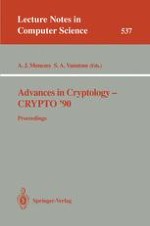1991 | OriginalPaper | Chapter
How to Utilize the Randomness of Zero-Knowledge Proofs
Extended Abstract
Authors : Tatsuaki Okamoto, Kazuo Ohta
Published in: Advances in Cryptology-CRYPT0’ 90
Publisher: Springer Berlin Heidelberg
Included in: Professional Book Archive
Activate our intelligent search to find suitable subject content or patents.
Select sections of text to find matching patents with Artificial Intelligence. powered by
Select sections of text to find additional relevant content using AI-assisted search. powered by
In zero-knowledge interactive proofs, a lot of randomized information is exchanged between the prover and the verifier, and the randomness of the prover is used in satisfying the zero-knowledge condition. In this paper, we show a new methodology that utilizes the randomness of the prover in a zero-knowledge proof for some positive objectives as well as for zero-knowledge condition. Based on this idea, we propose two types of applications; key distribution, and digital signature. We propose identity-based key distribution schemes that are provably secure against strong active attacks (chosen-message-known-key active attacks) assuming the difficulty of factoring a composite number. In addition, we show that non-transitive digital signature schemes can be constructed if and only if a one-way function exists. We also show some practical non-transitive digital signature schemes. A new general method of constructing identity-based cryptographic schemes is presented as an application of the identity-based non-transitive digital signature schemes. We also propose a new digital signature scheme based on the (extended) Fiat-Shamir identification scheme.
